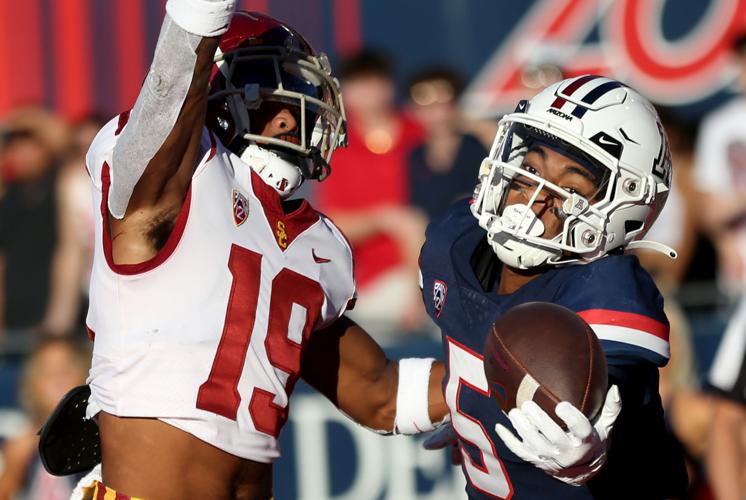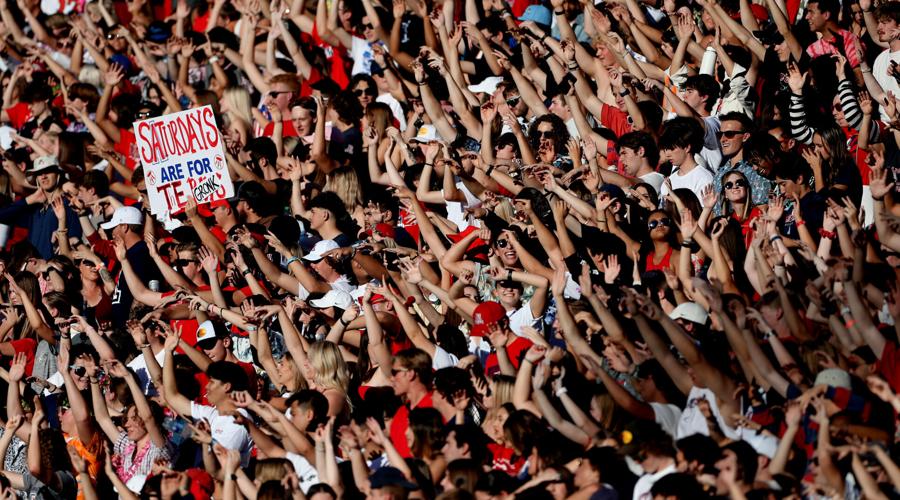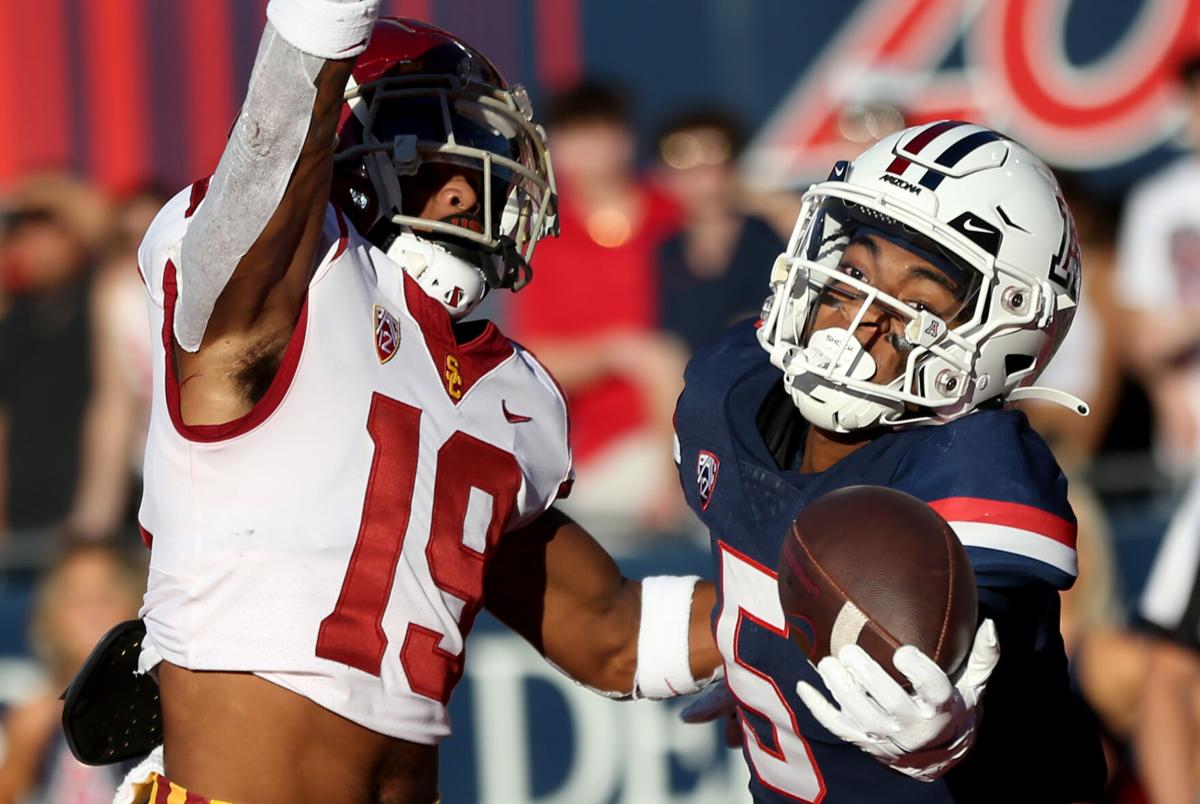Three large Gold Coast Tour buses drove single file down Speedway Boulevard early Sunday morning. Destination: The USC campus, 507 miles west.
The buses were filled with the Trojan Marching Band — the band famous for playing one monotonous tune over and over during a football game. As I watched the buses drive west toward Interstate 10, it made me wonder if it was worth it for 16 hours in a bus, three days away from home, just to spend four hours at Arizona Stadium on Saturday.
Expenses for an abbreviated road-game version of the Trojan band — about 100 members of the 300-person band that marches during USC games at the Los Angeles Coliseum were in Tucson — probably exceeded $20,000.
The answer is that USC is fully committed to college football, from the band to the 47 full-time employees of the football staff as listed on the USC website. That includes a “football art director’’ and five full-time strength coaches.
The Pride of Arizona Marching Band doesn’t make road trips unless it’s a bowl game or the Territorial Cup in Tempe. USC’s band is a traveling band, supporting its famous football team week after week (although that may change when the Trojans move to the faraway Big Ten in 2024).
Arizona is never going to be on an even playing field with USC’s football program. The overwhelming recruiting advantages the Trojans enjoy in Southern California, aided by a century of high-profile success and a national brand exceeded only by a handful of schools, makes moving up to USC’s weight class an impossible dream at Arizona.
That’s why Arizona and its fans reacted with positivity after Saturday’s loss to the Trojans. For 3 hours and 35 minutes, USC couldn’t pull away, couldn’t put ’em away, couldn’t crush ’em, couldn’t conquer ’em.
Fight on? The Wildcats sure did. They looked like they belonged with the nation’s 10th-ranked team.
About all that USC could do Saturday at Arizona Stadium was hang on, beating Jedd Fisch’s Wildcats 45-37.
When Trojan quarterback Caleb Williams gained three yards on a kill-the-clock drive with 49 seconds remaining, he became animated, shaking his fist, flexing his muscles, shouting something to the football heavens.
Can you remember when a USC quarterback last got so emotional beating a team that has gone 4-21 over the last few seasons?

The Arizona crowd gets up in arm as the Wildcats prepare to kickoff against USC.
This was the best evidence yet that Arizona is getting closer and closer to success.
““It was an awesome, gutsy win,’’ said USC coach Lincoln Riley. “So many guys stepped up.’’
That’s a welcome change from recent USC-Arizona games when the Trojans’ coach usually yawned a bit and probably had difficulty remembering if he had played Arizona or Colorado.
Saturday’s game was more promising than any of the 16 losses in Fisch’s 1½ seasons because (1) the Trojans are ranked so highly and have a Heisman Trophy-caliber quarterback and (2) because once USC extended the lead to 31-16 late in the third quarter, the Wildcats didn’t shrink.
They outscored USC 21-14 down the stretch and that’s about as good as you can hope for, especially when your talent-challenged defense yields 620 yards, which is 155 more than its porous average of 465 yards per game.
“You can see why they’re a Top-10 team in the country,’’ said Fisch. “There was not a time in the game we didn’t feel we could go head to head with that team, and we did it,’’ said Fisch. “We went head to head, toe to toe.’’
Full-disclosure: USC arrived at Arizona Stadium beat up, still limping from a 43-42 loss at Utah two weeks earlier. Riley did not play all-world receiver Jordan Addison, starting linebackers Eric Gentry and Ralen Goforth, starting lineman Andrew Vorhees and four others in the regular rotation.
But so what? The Trojans simply fill those gaps with four- and five-star recruits. For example, Addison’s replacement, second-teamer Tahj Washington, caught seven passes for 118 yards and two touchdowns.
And yet Arizona still had a chance to get possession and tie the game in the final minute. That’s a clear step up from last month’s 39-17 loss to Mississippi State and Oregon’s dominating 49-22 win at Arizona Stadium three weeks ago.
It’s not yet time for Fisch to look into the post-game TV cameras and say “we’ve arrived’’ or even “we’re arriving’’ but he can genuinely say “we’re getting there.’’
The problem is that the Pac-12 is endowed with so many franchise-type quarterbacks that the Wildcats haven’t been able to catch a break except for a victory over woebegone Colorado on Oct. 1.
Since mid-September, Arizona’s defense has given up 16 touchdown passes to potential NFL draft pick QBs Will Rogers of Mississippi State, Jack Plummer of Cal, Bo Nix of Oregon, Michael Penix of Washington and now USC’s Williams.
The most damaging number is that Arizona’s defense has intercepted just one pass in the 191 attempts by those five game-changing QBs..
Until the defense can be reinforced with recruits and transfers, this will continue to be an unavoidable issue, especially with Utah quarterback Cam Rising and UCLA’s Dorian Thompson-Robinson on the schedule the next two weeks.
Gulp.
One of the first things I did Sunday was to check the Pro Football Focus grades of the Arizona football team. For a $119 subscription each year, you can have access to metrics of the large PFF staff, estimated at 600 employees. Somehow, PFF breaks down and examines every player — every play, every week — on every Power Five football team and issues grades from 1 to 100.

Arizona fans in the ZonaZoo flex for the cameras during the Wildcats' game against USC.
A grade of 91-100 suggests a player is NFL-bound.
A grade of 84-90 suggests the player is at an elite level.
A grade of 70-84 suggests the player is a legitimate starter.
A grade of 60-69 suggests that player should be a backup on a Power Five team.
A grade below 60 suggests that player should be replaced.
We’ll never know how accurate the PFF metrics are, but in the year 2022 it’s the leading source in college football that measures each facet of play, at every position.
Here’s what I’m getting at: the PFF examiners graded 17 Wildcats who took at least 20 snaps against the Trojans in the 60s or below. That suggests those players should be subs or shouldn’t be on the field. And those 17 players are Arizona’s mainstays.
The only three Wildcats to rank in the 70s were quarterback Jayden de Laura, receiver Dorian Singer and running back Michael Wiley.
Yet somehow Arizona pushed USC to the limit, to the final 47 seconds.
So, yes, Arizona has come a long way, but the journey is just beginning.







